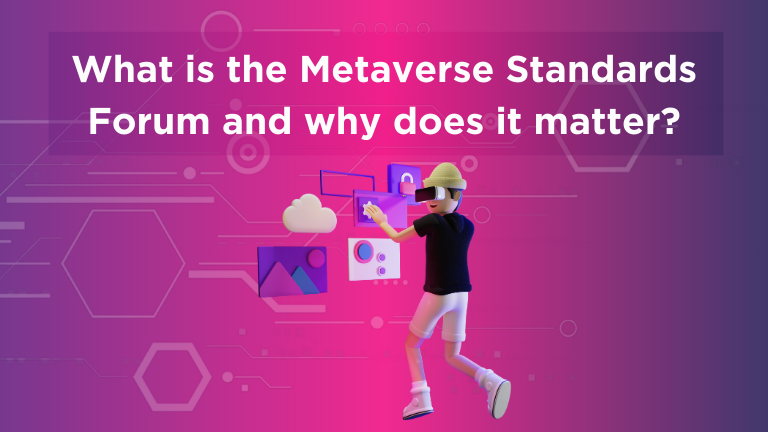Companies of all sizes are buying land in the Metaverse – is now the right time to invest?

The Metaverse seems to be the ultimate buzzword right now. Companies of all sizes are starting to think more critically about how the new “digital world” will affect them. On a global scale, there seems to be a growing urgency for companies to figure out their connection to the Metaverse and how they can prepare for it.
The Metaverse could have a massive impact on companies regarding how they hire new employees, interact with their customers, promote their brands, and generate revenue.
As a result, many organisations are beginning to invest more heavily in building “Metaverse” experiences. We’ve seen countless companies announce a “Metaverse plan” for the future. Or even begin the search for new talent to help realise their metaverse dream.
Increasingly, some brands also champion buying real estate and space in the “Metaverse” to build specific branded environments. Is it really necessary to “own” a portion of the Metaverse if you want to future-proof your company?
The Rising Desire to “Own” the Metaverse
One of the major issues companies are having with the Metaverse right now is that they don’t fully understand what it is or its benefits. Up to now, there’s no real definition of the Metaverse. We know it’s intended to be a space where communities and people can engage with more intelligent, digitally-driven technologies and experiences.
Many companies view the Metaverse as a new “landscape” for brand development. There’s a common misconception that the future Metaverse will be like the world’s biggest shopping mall. Comprising of industry events, branded consumer experiences and interactions. As a result, the concept of “Metaverse real estate” for brands has grown increasingly compelling.
The market for Metaverse real estate is growing at a rate of 61.74% per year. This furthers the idea that companies should purchase a digital spot in this new world if they want to connect with their customers, attract employees, and essentially “operate” in the Metaverse.
The trouble with this idea is that the Metaverse isn’t a single space. The majority of thought leaders in the Metaverse all agree that the “metaverse” as we know it will comprise countless digital environments connected through a decentralised web. That hasn’t stopped some of the world’s leading companies from trying to capture their own segment of the metaverse landscape.
The Companies Already Building in the Metaverse
There are various ways for companies to start buying into and building within the Metaverse today. One option is to build an entirely new virtual environment from scratch. However, only the biggest organisations, such as Microsoft and Meta, seem to be taking this route. More commonly, companies purchase snippets of existing metaverse landscapes, where they can create unique experiences for employees, customers, and communities.
For instance, Nike it’s “Nikeland” on the Roblox online gaming platform. The environment is complete with custom avatars, a version of the Nike headquarters building, purchasable NFT apparel, and mini-games. The aim of building this space in Roblox for Nike was to engage with its community through futuristic, personalised experiences.

Elsewhere, virtual worlds like the Sandbox are capitalising on the idea of purchasing real estate in the Metaverse. Companies can purchase “LAND”, in the Sandbox environment, which they can populate with various games and assets. Each LAND is actually an NFT which exists within the public Ethereum blockchain. A company’s space in the Sandbox can also be accessed by the over 2 million registered users leveraging the platform.
Companies like Atari have already purchased land in the Sandbox, where visitors can play virtual games and attend branded events. Adidas has its own NFT collection on display in the Sandbox too. And PWC owns a piece of real estate in the Sandbox. According to PWC, the company purchased this land with the belief that the Metaverse offers new opportunities for the organisation to engage with its customers and communities.
The Sandbox is far from the only virtual real estate vendor bringing “space” to companies for them to build experiences in the Metaverse. We also have Decentraland, where Samsung launched its own “Metaverse location” known as Samsung 837X.
The question is, can businesses benefit from purchasing space within an environment as mysterious and fluid as the “Metaverse”?
Is Buying Space in the Metaverse a Good Idea?
On the one hand, buying space and building experiences in the Metaverse could offer great value to companies. If nothing else, a space in The Sandbox allows you to interact with more than 2 million other people, which can significantly boost your brand reach. At the same time, experimenting with “space” in the Metaverse is a good way for companies to show their audience that they’re on the cutting edge of their industry.
As more customers continue to talk about and engage with different variations of the Metaverse, companies that seem to have an investment in this landscape have a great opportunity to stand out. Just like being the first company to use a new and trending social media platform in your industry, being the first to engage in unique experiences in the Metaverse is great for publicity.
However, not every business will benefit from going all-in on its Metaverse strategy. Many experts believe the Metaverse is still lightyears away from having any lasting impact on brand sales and conversions. Plus, there are thousands of different interpretations of what the Metaverse really is. The platform you invest in today, hoping to “join the metaverse” could be a thing of the past tomorrow!




